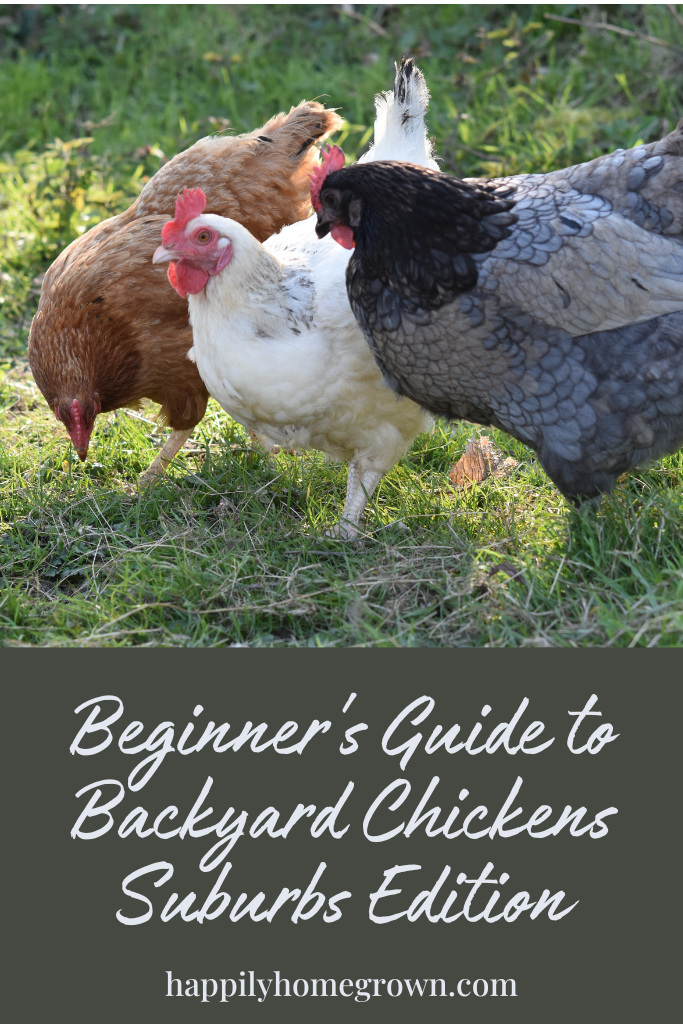Posts on Happily Homegrown contain affiliate links. When you make a purchase through an affiliate link, your price will be the same, but Happily Homegrown will receive a small commission. Thank you for your support!

There’s something magical about the gentle clucking of hens, the thrill of gathering fresh eggs, and the way chickens can turn a suburban backyard into a mini homestead. Here on our half-acre in beautiful Bucks County, PA, raising chickens isn’t just a fun hobby—it’s part of living a more intentional, homegrown life.
If you’ve been dreaming about farm-fresh eggs and feathered friends of your own, you’re in the right place. Let’s talk about the real joys (and the daily work) of keeping chickens in your own backyard.
Why Raise Chickens Anyway?
Sure, the fresh eggs are a huge perk, but chickens bring so much more to the table—literally and figuratively. Here’s why we love having a flock in our yard:
- Fresh Eggs, Every Day: Once you’ve had eggs straight from your backyard, store-bought just won’t cut it. The taste, the color, the freshness—it’s unmatched.
- No-Spray Pest Control: Chickens love snacking on bugs, which means fewer pests in the garden and less need for chemical sprays. We even like to collect bugs for our chickens – caterpillars, slugs, grubs, worms, and even beetles keep chickens happy
- Garden Gold: Chicken manure is compost gold. It’s nitrogen-rich and fantastic for your garden beds (just compost it first!). We add it directly to the garden beds in the fall and during the growing season we just add it to the compost pile.
- Great for the Kids: Whether you homeschool or not, chickens offer daily lessons in responsibility, biology, and where our food comes from. And who couldn’t use the occasional lap chicken?
Setting Up Your Backyard Flock
Getting started with chickens doesn’t have to be overwhelming. With a little planning and the right setup, you’ll be off and clucking in no time.
The Coop:
Your coop is their safe space—where they sleep, lay eggs, and stay warm and dry. Here’s what to keep in mind:
- Size Matters: Plan for at least 3–4 square feet per chicken inside the coop.
- Nesting Boxes: One nesting box per 3–4 hens keeps everyone happy and eggs in one place.
- Ventilation: Fresh air is a must to keep the coop dry and reduce odors.
The Run:
This is their outdoor hangout spot—where they scratch, peck, and explore.
- Secure Fencing: Raccoons, foxes, and even hawks are a real concern. Make sure your run is predator-proof. The bigger the gaps in the fencing the more easily a predator can get to your chickens.
- Shade & Shelter: Chickens don’t like getting too hot or wet. Offer some shady spots and shelter from rain. Tarps and shade cloth added to the outside of the run can be very helpful.
- Room to Roam: Aim for 8–10 square feet per chicken in the run to keep everyone from getting cranky.
Daily Care Tips for a Happy Hens
Once your chickens are settled in, keeping them healthy and happy becomes part of your daily rhythm.
- Good Feed + Kitchen Scraps: Start with a quality layer feed, then supplement with veggie & meat scraps and garden weeds (they’ll love you for it). We get our layer feed from Davis Feed Mill in Rushland, PA.
- Fresh Water Always: Chickens need clean water—change it daily, especially in hot or freezing weather.
- Health Checks: Keep an eye out for changes in behavior or appearance. Early intervention is key. Make sure to have a variety of medical resources (books, websites, medications) on hand since not all veterinarians treat chickens. Our closest poultry vet is over an hour away!
- Boredom Busters: Hanging cabbage heads, scratch piles, and logs to climb help keep chickens busy and engaged. We recently built grazing boxes for inside our run so the chickens can peck and eat grass and bugs, but they can’t scratch it up.
You’re Not Alone in This!
One of the best parts of raising chickens? The community. Whether you’re a total newbie or adding to your flock, connecting with others makes it even better. You can always find me over on Facebook or Instagram, where I share updates from our little farmette and answer your backyard chicken questions.
Backyard chickens have brought so much joy, learning, and connection into our lives. If you’re thinking about starting your own flock, I hope this gives you the confidence to take the first step. You don’t need a full farm to live a little more homegrown—just a bit of space, some curious hens, and a whole lot of love.




 How to Dye Beautiful Jewel-Toned Easter Eggs
How to Dye Beautiful Jewel-Toned Easter Eggs
Leave a Reply